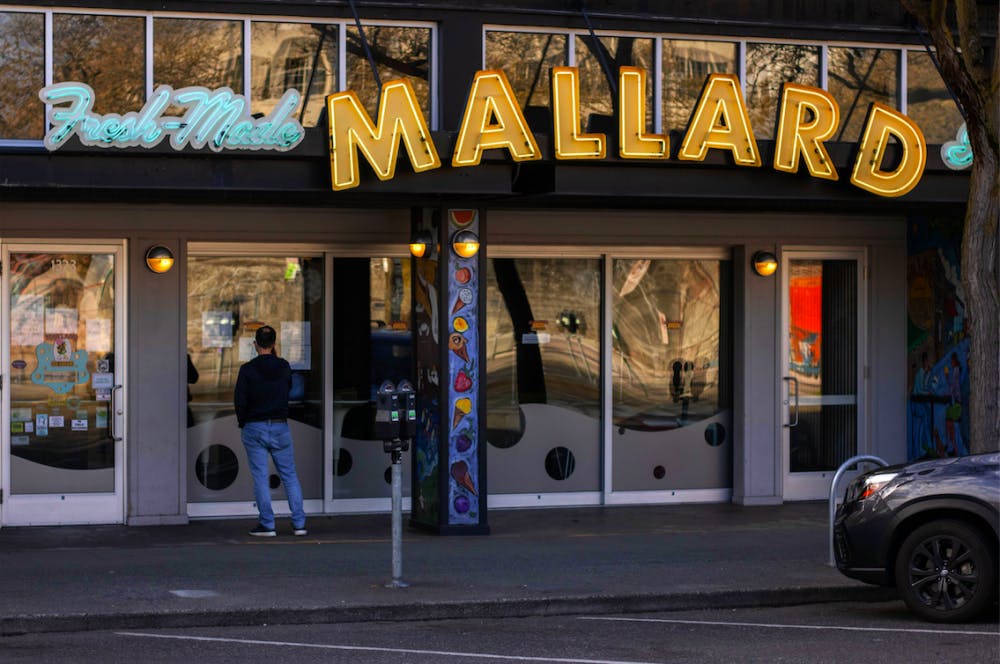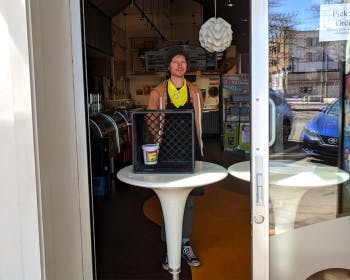
Local ice cream parlor wants to provide comfort, local business support during COVID-19 isolation, lockdown
The lights inside are off, the neon ‘Open’ sign is powered down and the usual cheerful lobby of Mallard Ice Cream looks deserted and gloomy. But despite the shuttered appearance, the business is still doing what it does best: serving ice cream, with a twist. From a pint of ice cream, Mallard provides supportPurchasing a pint of Mallard ice cream is supporting the community through local ingredient sourcing and community engagement.
Customers order their ice cream online, picking out their desired flavors and quantities. After the order is placed, the customer is asked to text the employee in the store to arrange a pick-up time. The system is meant to spread pick-up orders around so that a line doesn’t form outside. When it’s time to pick up their order, the customer stands 6 feet back from the sliding glass door.
Richard Sandbom, the general manager and an ice cream maker by trade, comes to the door, wearing gloves and a bandana covering his face. After confirming the order, he brings the ice cream in a milkcrate and places it on a table outside. Once Sandbom backs up, the customer can approach, grab their ice cream and retreat. The surfaces are thoroughly wiped down and the process starts over.
According to Sandbom, the service has been a success, but profits are not a priority for the business right now. Rather, he said, they wanted to provide services to a struggling community.
Sandbom said there have been just enough orders to make an impact, but not so many that anyone has been put at risk. It’s a nice reprieve, he added.
“Customers are looking for comfort, some sense of normalcy, or some sort of token of how things were before everything stopped,” Sandbom said.

Mallard Ice Cream is one of the many food service businesses doing what they can during the COVID-19 lockdown to stay open while staying safe. But beyond the joy of a bite of ice cream, what makes it worth all of this effort?
It starts with the ingredients: Local farms supply as many of the ingredients as possible, said Ben Sholtz, Mallard’s owner. They purchase two to three thousand pounds of fresh fruit from local farms like Cloud Mountain Farm Center, one of their partners, in a typical year, Scholtz said.
The business purchases large quantities of fresh fruit for the summer season and then freezes the rest to use during the slow season, Scholtz said.
However, coming out of the slow season into a lockdown has made the future uncertain, Scholtz said. It’s difficult to know what quantities of which product the business will need to make its variety of ice cream flavors.
Scholtz said despite the uncertainty, there is a mutual agreement between the suppliers and the buyers. There are ways that Mallard can support the local farm even if it’s not purchasing thousands of pounds of fruit for ice cream, like storing fresh food for other restaurants, preventing the waste of produce, Scholtz said. They may also purchase fruit in smaller quantities to supply for the summer season.
“I don’t really know what the future is,” Scholtz said. “But seeing the relationships between people that have been built up over the years and then seeing how going through something together strengthens them has been really vivid. Seeing how that, before anything else, you just care for and admire these human beings.”
Cheryl Thornton, the program market development and finance coordinator for Cloud Mountain Farm Center, also believes in the relationships the center has built. The farm, 30 minutes north of Bellingham, has been in operation for almost 40 years and it supplies a range of businesses, from restaurants to grocery stores to the Bellingham School District, Thornton said. That diversification may support the farm during the lockdown.
“Relationships are really important. I know that the businesses that buy from us and support us believe in that, and I trust that implicitly,” Thornton said. “I also think the businesses believe that they can trust us and we can trust them.”
Mallard sources its dairy product, arguably the most important ingredient when it comes to making ice cream, from a small family dairy farm in Oregon, Scholtz said. The Western Front was unable to contact the farm and reached out to Edaleen Dairy, a local Whatcom County dairy farm, instead.
Edaleen, which employs 110 people, has temporarily closed its ice cream parlors in the six Whatcom County locations, but the farm is still producing dairy products for restaurants and consumers, Mitch Moorlag, Edaleen’s general manager, said.
Morlag said Edaleen’s local partner business, Dairy Distributing, Inc, has been working with Edaleen to deliver dairy the old fashioned way: right to people’s doorsteps.
Morlag said supporting local businesses right now is important for two reasons. Keeping money in the local systems allows for those businesses to give back to the community and shopping local allows for increased consumer product confidence, Moorlag said.
“The businesses and the people that you are supporting when you source locally are the businesses and people that are supporting your community in turn,” Morlag said. “Secondly, you need to be able to have your own personal confidence in the product you’re purchasing. The more you know the people who are producing, packaging and delivering that product, the safer it’s probably going to be.”
In addition to supporting local supply chains, building strong relationships with customers and community is another way to provide support, and Mallard strives to create those opportunities, Sandbom said.
Serafima Healy, co-founder of the Bellingham band The Mary Anns, said Mallard provides an important service to the local community.
“Supporting the local community looks like creating a space where all people are welcome and where people want to go. It creates a space where people can go and engage with other people,” Healy said.
The ice cream draws people in, but the cheerful, positive atmosphere of the store and its employees is what makes Mallard so special for the community, Healy said.
Many factors had to be considered when Mallard decided to open for ice cream pick-up service, Sandbom said. Most importantly, they didn’t want to put people at risk.
“I didn’t want to just do nothing, but I didn’t want to put myself or other people at risk,” Sandbom said. “Our thoughts were, ‘If this is something that’s useful for you right now, it’s useful for me to facilitate it.’”
Mallard has had to lay off its employees until they are able to reopen, and that has been very difficult, Scholtz said. But he hopes that they will be able to reopen, rehire and continue serving delicious ice cream with updated policies and practices as the situation calls for in the future.
“The challenge is the total interruption of what you’re used to doing. It’s strange for us, too,” Sholtz said. “I think that the level of honesty and transparency of just being able to say to people, ‘This is exactly where we’re at,’ is a success. The first step we can do is to make ice cream, simply and safely, and get it to people. We’re taking baby steps.”





